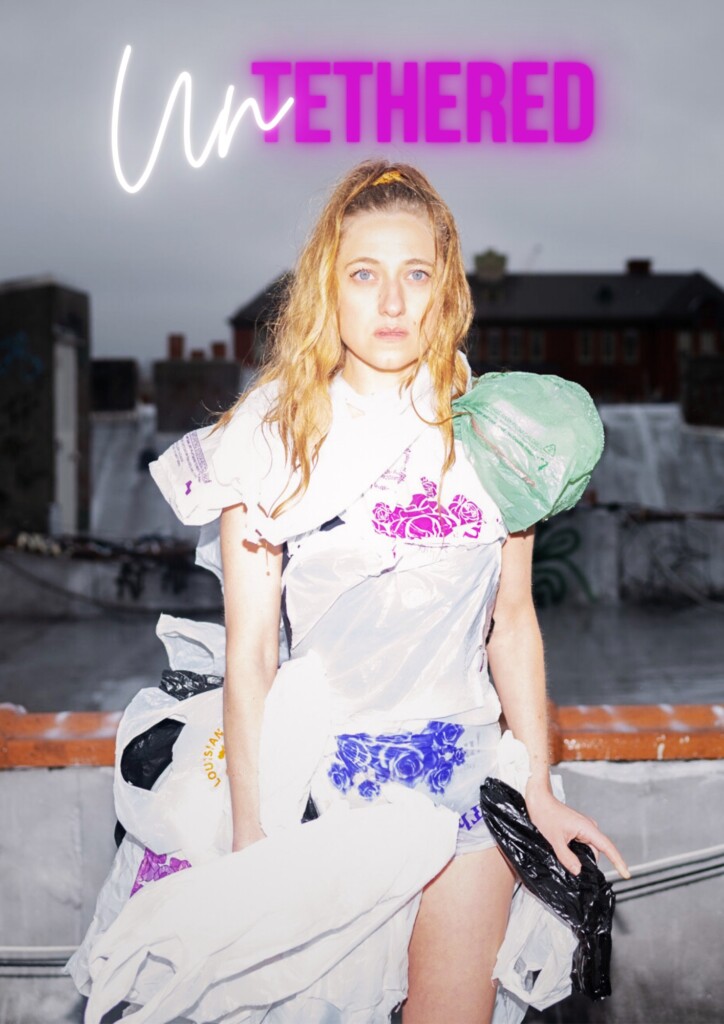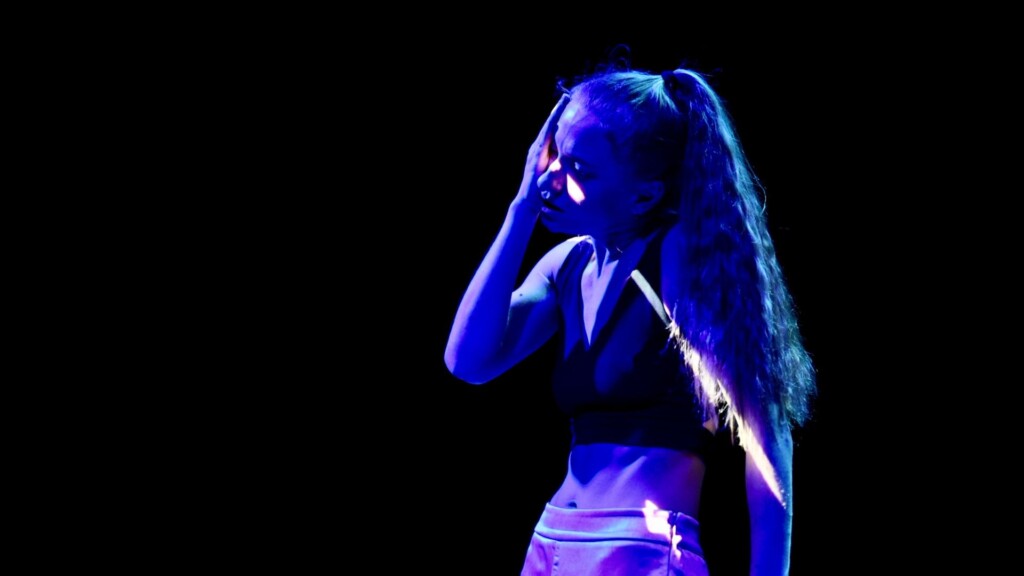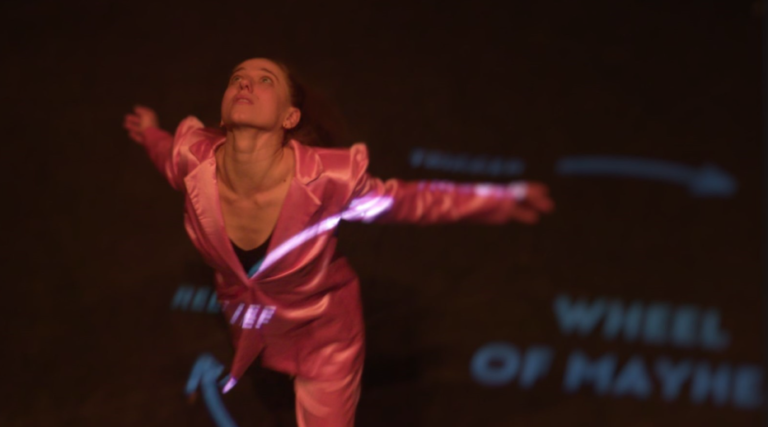By Tana Rose Sirois, Blue Festival’s artist
It’s been two weeks since I performed my autobiographical solo show at Blue Festival: The Art of Mental Health. In the past 14 days, I’ve adopted a slower pace, allowing myself time to move through the intense feelings of vulnerability, embarrassment and regret that often accompany the sharing of such personal material. (My play, UnTethered, is about my experience with obsessive-compulsive disorder, demisexuality, and the challenges of physical intimacy. It’s a comedy. I hope.)
As I braced myself for that familiar anxiety that took hold after I had disclosed “too much” and prepared for the powerful impact of post-show emotional exhaustion, a curious thing happened — I felt no anxiety, and I felt no shame. While this could potentially indicate an internal shift towards acceptance of the story I chose to share, I think the ease of this experience can be primarily attributed to the environment in which I performed. The Blue Festival, produced by People’s Palace Projects, provided a safe and empowering atmosphere, infused with practical support and genuine compassion. As I sunk deeper into my appreciation for those who facilitated this experience, I began to meditate on how important it is to have access to spaces that inspire exploration and creation — spaces where we are encouraged to expand.

UnTethered, like a lot of autobiographical work, was born out of a need to communicate my experience. OCD is often portrayed as a comical disorder, centered around the clichés of obsessive cleaning and organization. The crippling intrusive thoughts common in OCD are rarely mentioned, and there is little acknowledgement of the impact OCD has on one’s ability to feel secure in relationships and be present in one’s own life. The eccentric, socially awkward personality trope of OCD has caused me to shy away from speaking about a disorder that, in truth, has to do with fear and doubt, not a desire for organization. I feel preemptively exhausted at the effort it will take to over-explain how I am not particularly bothered by dirt or clutter, but I am tormented by a fear of diseases that are transmitted via bodily fluid and have a consistent and irrational fear of being jailed for accidentally breaking the law.
I’ve skirted around using the term “demisexual”, as well. I’ve felt frustrated by the need to consistently explain what demisexual means (someone who requires a close emotional bond before experiencing attraction), and resentful of the pressure to box myself into an orientation simply because the intricate way I experience desire feels too laborious and time-consuming to explain. When it comes to demisexuality, I feel in discordance with the rest of society. The more I learn about how I experience love, the more this feeling of separation and isolation grows, impacting my ability to connect and be open.
It seems that many of us only disclose the way we experience attraction and intimacy to romantic partners or therapists, if at all. The problem with keeping these feelings private is that people like me grow up thinking something is wrong. We begin to believe that we don’t deserve to have fulfilling and enjoyable relationships. We often expend great effort trying to adapt, change, or “fix” ourselves, when this energy could instead be used to unearth novel ways of connecting and communicating; it could be channelled towards expanding curiosity and appreciation for the unique and beautiful inner workings of the self. (Of course, there are some things I would like to “fix” about myself, such as my need to check that the stove is off 100 times before leaving the house — I’m working on that.) Unfortunately, there are very few spaces in this world that allow for personal disclosure and exploration, let alone encourage it. If these honest and important conversations only happen in private spaces, it will be much harder for the powerful realizations that come from self-exploration to reverberate on a larger scale and create the momentum necessary for wider understanding and acceptance — for change. Of course, this is where artistic expression becomes vital in our evolution towards a safe and equitable world.
I made UnTethered because I was sick of trying to discern the correct moment and appropriate method to reveal “the way I am” to potential romantic partners. (Do I lead with an introduction to OCD and my crippling fear of STDs? Or is it better to explain demisexuality first, as this also contributes to my disinterest in casual sex?) I was fed up with not feeling heard, and I was frustrated by my inability to succinctly articulate what I needed to feel safe and connected. I began fantasizing about making a show that, in 60 minutes, both accurately summarized the complex way my OCD and demisexuality impact each other and introduced my desire to expand past this tangled web of pathology and branding. I envisioned looking out at the audience after performing the show, yelling “This is me! Take it or leave it!” I felt euphoric. I imagined how this show could potentially help people who shared a similar experience feel less alone, and that made me feel euphoric, too. So, I began the challenging process of trying to find the words.
The experience of writing UnTethered ended up being far more therapeutic than I anticipated. It’s true what they say — that staging experiences helps you “work through” complex emotions and past trauma. Events that had incited tremendous amounts of turmoil and panic lessened in emotional intensity when I viewed them through a creative, often comedic lens. I wanted the audience to feel the sheer terror of my catastrophic fears, and simultaneously recognize, as I do, that these fears are somewhat absurd and highly unlikely. (I overestimate the likelihood of threats). I found myself utilizing genre eclecticism — I began exploring slapstick comedy, direct address, stand-up, movement theatre, heightened text, puppetry, improvisation, and musical theatre as ways to abstract my fears. Eventually, I began to feel a genuine distance between my fears and myself. It was easy to “be with the fear”, but it was also possible to step away from it, and at least for a moment or two, reduce the fear to a ridiculous puppet made from plastic bags that would not stop blabbering on about how the dog that licked my hand in Thailand had almost certainly given me rabies.
While I faced many challenges making this autobiographical work, (the all-consuming fear of self-indulgence, for one), the largest barrier was my own resistance during periods of intense self-doubt. Every theatre-maker knows that you must make work you hate before arriving at what feels true, but pushing through this process is exceptionally excruciating when the work is entirely self-driven, extremely emotionally demanding, and features content so close to your bones. I don’t think I would have made it through my intense blocks of artistic self-loathing if People’s Palace Projects had not programmed UnTethered at Blue Festival. In doing so, they provided a clear deadline to present this work-in-progress, practical support (rehearsal space, a venue, and an audience), belief in me as an artist, and most importantly, a safe space to explore.

The Blue Festival intentionally set out to examine the role the arts play in wellbeing by providing a space for artists and mental health professionals to convene and share their work. People’s Palace Projects curated a program of film screenings, photography exhibitions and live performances that question how mental illness is perceived. They programmed workshops that explored how performance can be used to challenge oppression and presented panel discussions featuring psychiatrists, lecturers, theatre-makers, filmmakers, and those with lived experience in the care system. These dialogues investigated effective and empathetic ways to frame and respond to issues of mental health. Together, we interrogated the social structures that contribute to poor mental health and encouraged creative suggestions for positive change.
I did not intend to go into such personal detail regarding the content of UnTethered when I began writing this, but it felt necessary to highlight two things: one, the power of finding the words to communicate an epochal experience that you have never seen reflected cannot be diminished; two, the healing work that can occur during the process of creating such a personal piece and having it witnessed by an empathetic audience is unimaginable.
When curiosity and exploration are met with safety and reassurance, we experience a sense of belonging, and this sense of belonging allows us to become — to evolve into the next version of ourselves. Performing UnTethered gave me this experience. I know that finding environments that support this process is rare… but perhaps it doesn’t have to be. While I know most people have no desire to publicly share their stories through an artistic medium, I do believe that all of us long to feel in alignment with ourselves and with the world. I wonder what impact it would have, if every one of us, in some small way, intentionally made space for belonging. If we consciously created environments for honest communication and met curiosity and exploration with reassurance and support, I believe that we would incite profound change.
UnTethered is “about” OCD and demisexuality, but at its core, it is really about the freedom inherent in this continuous process of becoming. I felt this freedom when I claimed the diagnostic label of OCD and discovered the orientation of demisexuality, and I have also felt this freedom in the periods of time when I have released these labels and fixed identities in an attempt to expand. I find great liberation in the concept of continuous change, and I am hopeful that if we keep making physical and metaphorical space for exploration — if we meet our discoveries with acceptance — our souls will grow accustomed to a sense of belonging. Maybe then, we can truly delight in the process of ‘becoming’ — of evolving into the next version of our ever-changing self.
Tana Sirois website – https://www.tanasirois.com/
Follow her on social media
